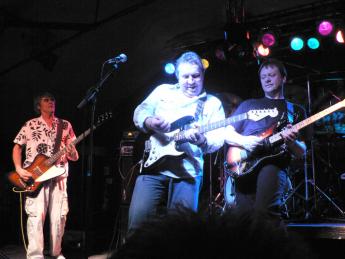Search
Rychard Carrington reports on Focus, Martin Turner's Wishbone Ash, Strawbs - Cambridge Corn Exchange, 12 October 2009

The tour's official name, Classic Legends of Rock, may be an overstatement. Good bands of the early seventies might have been more accurate. And that's quite good enough for me. Good bands is just what they were (and are): not larger-than-life persona, role models or cultural leaders, just purveyors of interesting, enjoyable music from the vintage era when pop pleasure, rock energy, developing musical sophistication and adventurous experiment came together so well.
The Strawbs provided a sedentary start - they were all sitting down and so were we. They played as an acoustic trio: Dave Cousins, Dave Lambert and Chas Cronk, all on guitars. Cousins' songwriting has been descibed as a cross between Bob Dylan and John Bunyan. He might not have Dylan's flair or Bunyan's spiritual rigour, but that description does provide a fairly accurate picture of what he attempts. It was progressive rock epic drama with a seventeenth-century feel - although tonight one had to imagine the keyboards, bass, drums et al. Yet still they did good justice to an enjoyable and distinctive style. Dave Lambert in particular played and sang with a lot of energy for someone sitting down.
Martin Turner's Wishbone Ash [pictured] played an opening number, then declared that the rest of their set would be the whole of the Argus album. I think everyone was pleased, as Argus is widely and rightly acknowledged as Wishbone's masterpiece. The vintage Ash sound was faithfully recreated (despite no other original members; Ray Hatfield and Danny Wilson in the twin-lead-guitar postitions), and what a great rock sound it is too: airy and rousing, dominated by electric guitar, yet so far from heavy metal. Blowin' Free - their final number - desribes their sound rather well.
Thijs Van Leer reminds me of Toad of Toad Hall. The extent to which he knowingly hams it up as a camp eccentric isn't clear, but one wamed to him considerably nevertheless. With his keboards, flute and yodelling, he provides Focus with their unique character. It was good to see original drummer Pierre van der Linden back, and playing superbly (including a great solo). Guitarist Niels van der Steenhoven (yes, they are Dutch) and bassist Bobby Jacobs are also top-notch musicians, and between them they produced a classic Focus sound which was actually sharper and more energetic than on the early albums. One wonders whether such engaged talents feel restrained by an audience expecting numbers written over thirty-five years ago. Old masterpieces Sylvia and Hocus Pocus were given extended treatments: imaginative embellishments perhaps satisfying desires for both fresh creativity and homage to a distinguished past.
All in all a night of great music, that has in no way been outmoded. If sunbsequent generations of musicians and audiences haven't pursued the direction of such bands, the more fool them.
Writer: Rychard Carrington